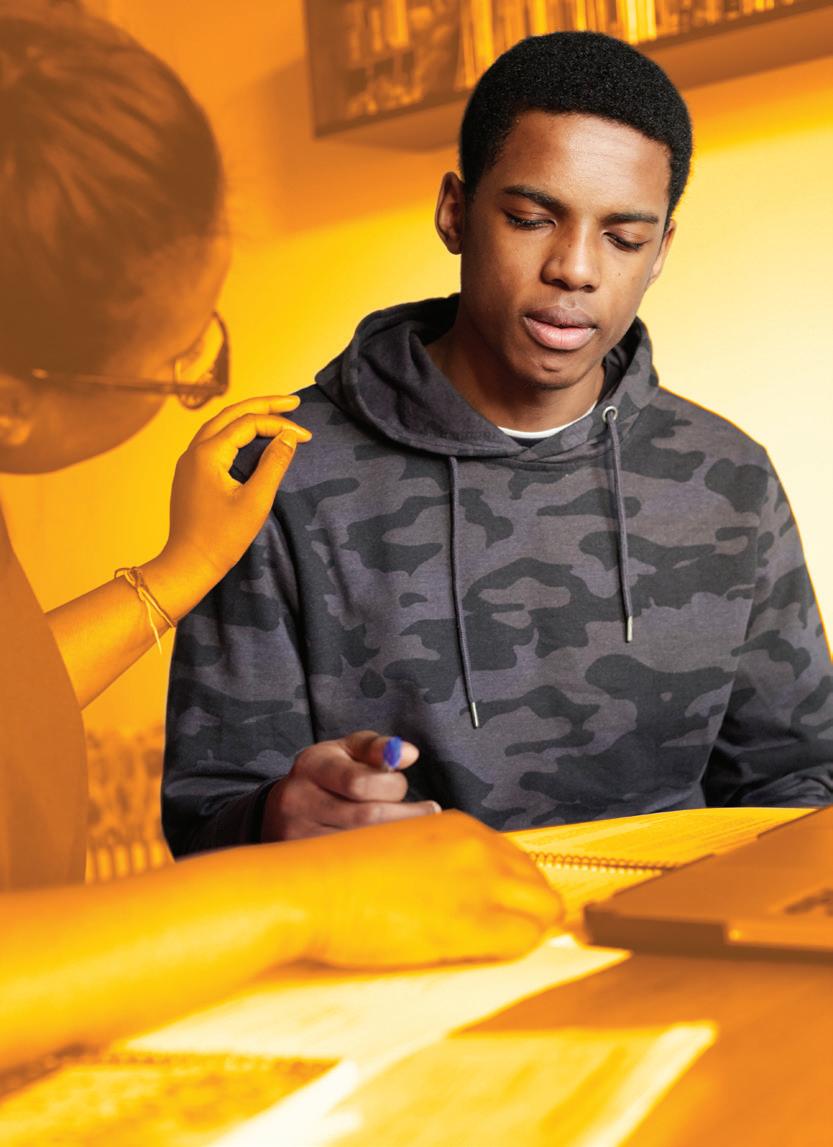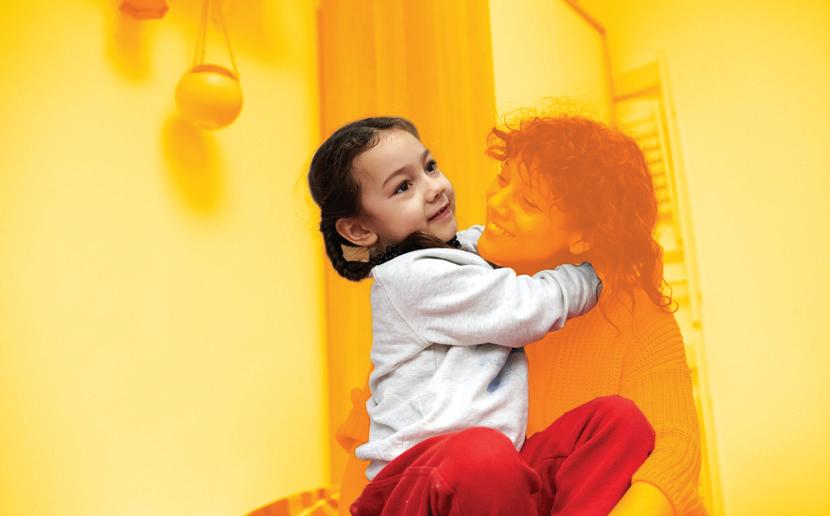Young Minds Matter

Your guide to caring for the mental wellbeing of a child

youngminds.org.uk/young-minds-matter



“I feel the age bracket from 16—25 is very under supported in many communities, and yet there are some of the strongest societal pressures and expectations laid upon this age group.”
- Charlotte
Mental heath in children and young people

Children and young people’s minds are developing at a rapid rate.
And as they grow up, all the challenges they face can affect their behaviour, emotions and their view on the world. In today’s complex society, those challenges can lead to difficulties which have a big impact as children get older.
In this leaflet you’ll find information on children and young people’s mental health, what can affect it and where to go if you need help with your child.
1
Why worry about mental health?
Good mental health is an important part of living a happy and fulfilled life – whether you’re 93, 33 or 3 years old

It’s easy to think children don’t suffer the same way adults do – after all, they don’t have the same pressures such as money worries or relationship issues which can bring adults down.
But growing up is difficult. Whether it’s making friends at school, seeing their bodies change as they mature or coping with family problems, these challenges can sometimes feel overwhelming and can lead to mental health difficulties that can continue to affect a young person in later life.
youngminds.org.uk/young-minds-matter
The importance of good mental health

Research has shown that children and young people with good mental health:
• Do better at school
• Develop good relationships with friends and family
• Learn and play appropriately for their age and understanding
• Develop a sense of right and wrong
• Learn from their experiences
• Have the confidence to try new things
So a child with good mental health when they’re young is much more likely to have good mental health as an adult.
3
Nearly 80,000 children and young people suffer from clinical depression in the UK.
3 children
80,000 in every classroom in the UK have a diagnosable mental health condition
youngminds.org.uk/young-minds-matter

You can help
Every child needs three key things:

• Love
• Security
• Understanding
And it’s the adults in their life who provide them.
That includes parents and carers, as well as relatives, teachers and family friends.
So your support is essential in making sure that the environment your child grows up in, is best able to help them grow up with a healthy mind.
5
“It is often difficult to identify a child or young person in difficulty as they can find it hard to explain their feelings – even to themselves. It is often through their behaviour that they send us the signals that they are feeling troubled.”

youngminds.org.uk/young-minds-matter


What can affect a child’s mental health?

There are a whole host of things in life that can make growing up hard, including:
• Family relationships
• Friends
• School pressures
• Technology
• The media
Most children cope well, especially when they grow up in a supportive environment. In some cases, children can have a genetic predisposition towards a mental illness or psychological issue. But there are also things that happen around them that can trigger difficulties, such as:
• Divorce, separation or bereavement
• Physical and mental illness or disability in the family
• Parents with alcohol or drug problems
• Financial or housing problems
• Bullying
• Learning difficulties
7
Supporting your child and getting help early
If you think your child might have a mental health problem, your support is essential. Support could be:
• Talking openly and honestly with them about mental health
• Listening and acknowledging how they’re feeling
• Encouraging and reassuring them
• Trying to work out what the best way forward is together
• Keeping yourself well supported too
Spotting a problem early, providing support and asking for help if you need it can prevent your child from developing certain problems or difficulties such as:
• Becoming very withdrawn or sad
• Anxiety youngminds.org.uk/young-minds-matter

• Panic attacks and phobias
• Obsessive or addictive behaviour
• Sleep problems
• Eating problems
• Problems focusing or concentrating
• Aggressive or disruptive behaviour
• Self-harming
• Wetting or soiling

• Refusing to go to school or difficult behaviour in school

• Problems with friendships or bullying
• Risk-taking behaviour
• Drug or alcohol use
9
What help is available?
If your child’s problems continue to the point where they’re very distressed, confused or out of control and you feel you need professional help to manage it, there is support available.
The first person to contact is either your GP, social worker, a teacher at your child’s school or a health visitor. They’ll be able to put you in touch with the most appropriate service to help you. Those services include:
Child and Adolescent Mental Health Services (CAMHS)
Specialist NHS services run by trained professionals such as psychiatrists, psychologists, psychotherapists, family therapists, social workers, doctors, nurses, counsellors and occupational therapists. You’ll normally be referred to CAMHS by your GP if your child is under 16 years old and approaches CAHMS themselves, you’ll normally be contacted if any further help is needed. Most CAMHS services will accept referrals from school nurses and social workers too. youngminds.org.uk/young-minds-matter

Youth counselling centres – these groups specialise in counselling young people and hold sessions in schools, youth clubs and specialist advice centres. Children under 16 can refer themselves to these services, although a referral is usually provided by a GP or your child’s school.
Specialist helplines and websites – there are a number of different organisations which run helplines, forums and online chat services where young people can go to talk about what’s worrying them (search online youth counselling services)
YoungMinds Parents Helpline - a free, confidential service for parents where you can talk through any problems your child is facing and where our expert advisors can provide information about support and services in your area. You can contact us Mon to Fri from 9:30am to 4pm on 0808 802 5544.
You’ll find contact details for all these helplines and organisations at the back of this booklet.
11
Useful contacts
youngminds.org.uk
Our free, confidential Parents’ Helpline offers information and advice to any adult worried about the emotional problems, behaviour or mental health of a child or young person up to the age of 25.


Helpline: 0808 802 5544
Parents Helpline
0808 802 5544
youngminds.org.uk
Mon-Fri 9.30am-4pm
Email: parents@youngminds.org.uk
Mon-Fri 9:30am – 4pm
youngminds.org.uk/young-minds-matter
Relate - the relationship people. Help with all aspects of family life
Telephone: 0300 100 1234
themix.org.uk

The Mix give free information and support for under 25s in the UK. They provide advice about sex, relationships, drugs, mental health, money & jobs.
Telephone: 0808 808 4994
Royal College of Psychiatrists
Provides a range of leaflets and factsheets about children and young people’s mental health.
Website: www.rcpsych.ac.uk
relate.org.uk
13
Fourth Floor, India House
Curlew Street London SE1 2ND Telephone 020 7089 5050 ymenquiries@youngminds.org.uk
Registered charity number: 1016968 Company limited by guarantee number: 02780643

YoungMinds
youngminds.org.uk
45
Thank you to Dr Andrea Gnanadurai and her colleagues at the Child and Family Public Engagement Board, Royal College of Psychiatry for fact checking this booklet. 0808
5544 youngminds.org.uk Mon-Fri 9.30am-4pm Parents Helpline
802






















